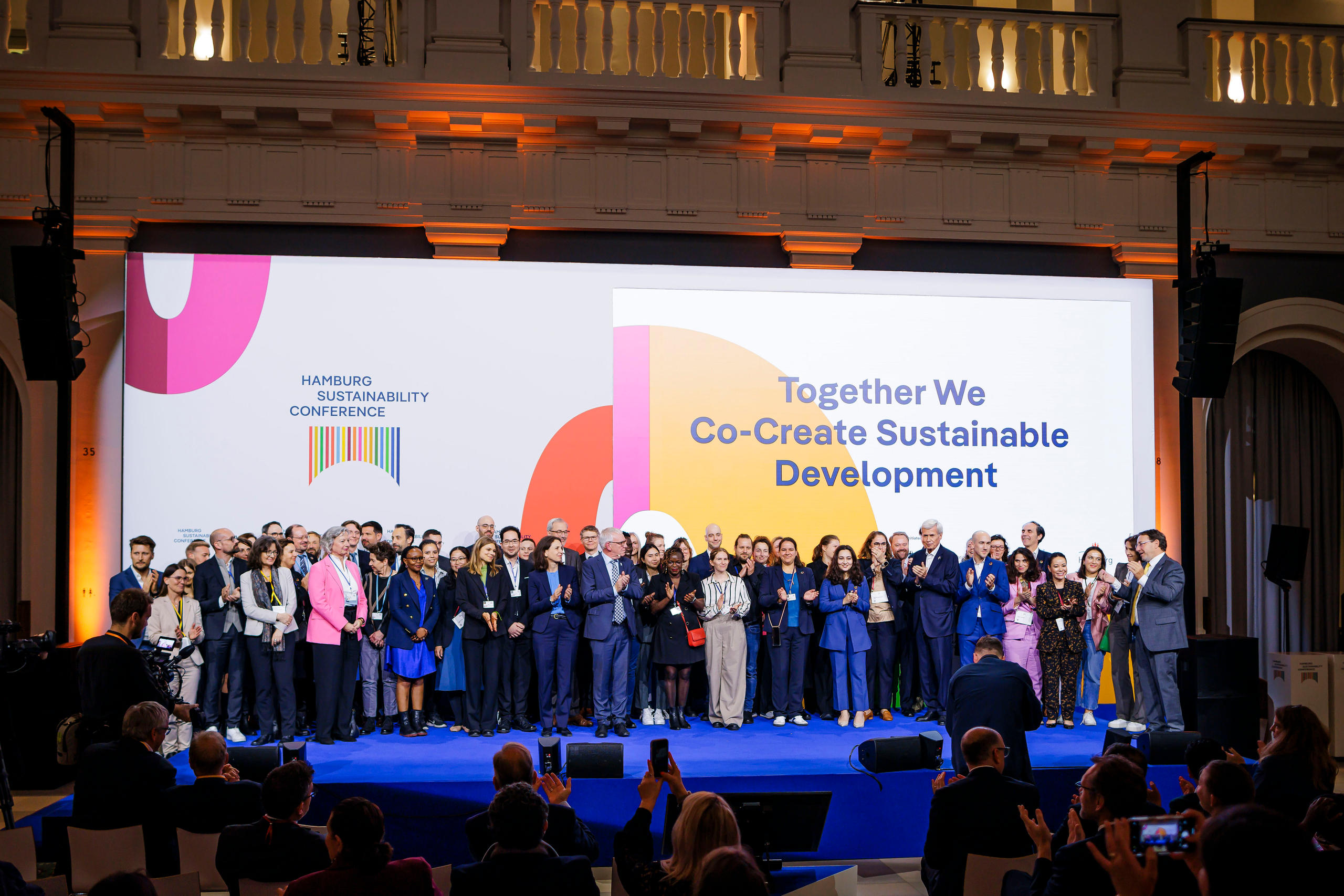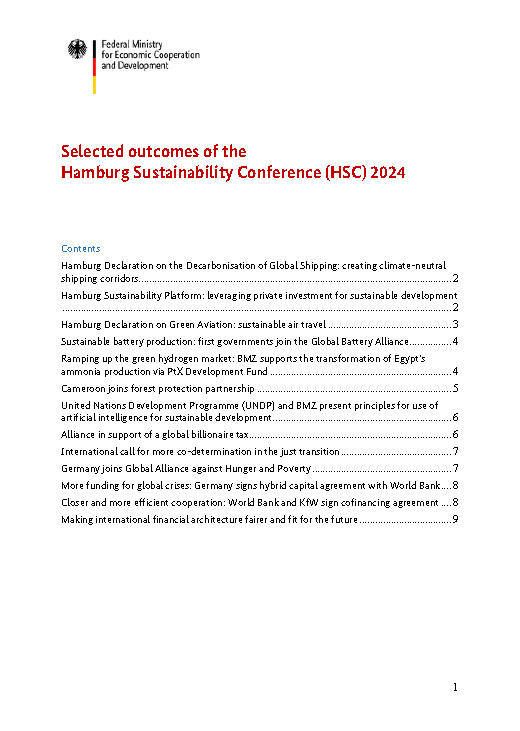First Hamburg Sustainability Conference More than 15 agreements for a sustainable future
Closing event of the Hamburg Sustainability Conference
Development Minister Schulze said, “This conference has been a source of encouragement for international cooperation. In the midst of a difficult global situation, the Hamburg Sustainability Conference has breathed new life into a simple insight: We all do better when we work together and not against one another. In Hamburg, we succeeded in bringing together new alliances for concrete solutions: for shipping that no longer emits CO₂, for batteries that are produced in a fair and environmentally friendly way, for more private investment in sustainability or for a just transition, to name just a few examples. This has created a strong tailwind for this new conference format: in the coming months, we will deepen these alliances and focus on further challenges before we meet again in Hamburg in June 2025.”
For two days, Hamburg played host to the world: around 1,600 participants from 102 countries accepted the invitation to “co-create” a new conference format at an event jointly organized by the Federal Ministry for Economic Cooperation and Development (BMZ), the UN Development Programme (UNDP), the Free and Hanseatic City of Hamburg and the Michael Otto Foundation. In over 60 events, the participants not only discussed key global challenges but also agreed on concrete steps for tackling them. Around 60 organizations are involved in the agreements reached; examples include:
Leveraging private investments in sustainability – “Hamburg Sustainability Platform”
Insurance companies, pension funds and other large investors have enormous sums of money that they want to invest. At the same time, there are large investment opportunities in many countries in Africa, Asia and Latin America that are not being exploited. There is often a lack of money for sustainable development, for example for wind farms, solar plants, hydrogen production, infrastructure, nature conservation and entrepreneurship. The problem so far is that this type of investment is only for the brave. Those who want to invest in distant countries often have to find their own way through the maze, which puts many people off. But if the world as a whole is to become more sustainable, investment that is now limited to the brave few must become an investment opportunity for the many.
The solution agreed in Hamburg is to jointly carve a path through the thicket of risks: The public partners – the BMZ, but also fellow campaigners from Canada, the UK, South Africa, Denmark and France – want to agree on a standardized approach for using public money to cushion the risks for investments in sustainable development. The private partners – as of today Allianz Insurance and the Canadian pension fund CDPQ – are joining in so that this path can later be followed by them and many other investors. The aim is to use limited public funds to leverage a multiple of private investment in sustainable development – to the tune of billions. Initial progress should be made by the next Hamburg Sustainability Conference.
International “Call to Action” for a just transition
The world is transitioning away from fossil fuels and towards renewable energies. The current structural change is having a massive impact on many employees not only in the energy sector or the transport sector but also in agriculture or in the booming IT industry. The transition to a sustainable future will be better if governments, employees and employers all pull together. At the initiative of the BMZ and the German Trade Union Confederation (DGB), the Director General of the International Labor Organization (ILO), Gilbert Houngbo, and representatives of international social partners came together at the HSC to launch a joint call for more say in climate transformation – for a socially fair structural change that preserves good jobs and creates new ones.
Responsibly produced batteries for electromobility: “Global Battery Alliance”
The Global Battery Alliance has been campaigning for the sustainable production of batteries along the entire supply chain since 2017 and is currently working on setting a global sustainability standard. However, producers of critical raw materials have so far been underrepresented and national governments had yet to join.
This gap has now been closed at the HSC: the BMZ and the Serbian Ministry of Economy have joined and Zambia has also announced its accession. This means that Serbia, which has large lithium deposits, is for the first time a member of an alliance that sets international sustainability standards in the raw materials sector. Zambia is a copper producer and also has nickel deposits. By joining, both countries are aiming to become part of the supply chains for European products. Companies such as Volkswagen, BASF, BMW, Henkel and Siemens are also members of the Global Battery Alliance. The sustainability standards developed as part of the Alliance include, for example, ensuring that batteries and their raw materials are produced without child labour, that water resources are protected, that indigenous rights are respected and that those affected are involved locally. The BMZ wants to encourage other ministries and directly affected parties to join the Battery Alliance in the future.
Mobility of the future: “Hamburg Declaration on Green Aviation” and “Hamburg Declaration on the Decarbonization of Global Shipping”
Aviation and shipping bring the world closer together, but also contribute significantly to climate change; global shipping alone emits more greenhouse gases than the whole of Germany. There are technical solutions for climate-friendly propulsion systems: fuels based on green hydrogen, which is produced using electricity from wind and sun. To turn these theoretical solutions into reality, many players need to be on board: fuel producers, logistics companies, port and airport operators, scientists and financiers, with legislators ensuring the right political framework conditions. The HSC has brought together those involved in these new value chains for sustainable, renewable fuels for shipping and aviation:
With the “Hamburg Declaration on the Decarbonization of Global Shipping”, more than a dozen companies have agreed to work together on the development of sustainable shipping corridors, research and development, knowledge exchange and the financing of investments. Three countries – Brazil and Denmark in addition to Germany – are supporting the initiative.
The ten signatories of the “Hamburg Declaration on Green Aviation” have also agreed to work together to develop “Green Aviation Hubs” in the areas of research and development, knowledge exchange and financing. The signatories include Hamburg Airport, Deutsche Post AG and the South African company Sasol.
In addition, the Hamburg Sustainability Conference provided a forum, for example, to drive forward the ongoing international debate initiated by the Brazilian G20 Presidency on a minimum tax for the ultra-rich with partners such as the African Union and Barbados. Furthermore, conference participants discussed in several formats which concrete approaches for a more representative, fair and at the same time efficient setup for the international financial architecture have a chance of reaching agreement.
The concerns and needs of future generations were also discussed at the HSC. After all, the decisions we make today will have consequences for ten billion people who will be born this century. To give them a voice and directly address the implementation of the Declaration on Future Generations, UN Under-Secretary-General Guy Ryder announced at the HSC that UN Secretary-General António Guterres will appoint an Envoy for Future Generations.
The end of the first Hamburg Sustainability Conference marks the beginning of the preparation process for the next HSC, which will take place on 2-3 June 2025. In the months until then, work will continue on deepening the agreed alliances, gaining new partners and tackling other pressing issues.
More information here: https://www.sustainability-conference.org/en/ (External link)

